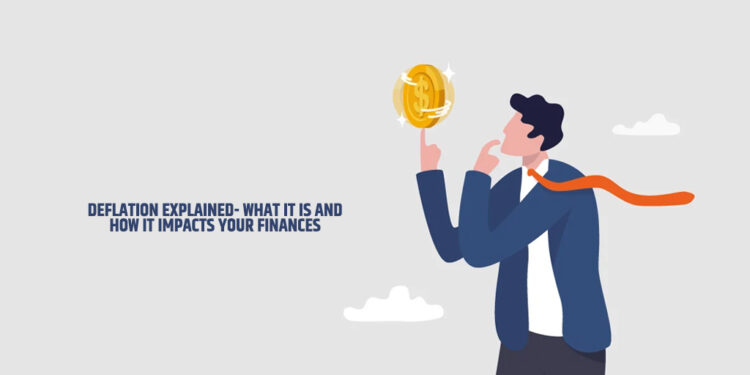A key economic idea called “deflation” has huge effects on people, companies, and states alike. But exactly what is deflation? When prices of goods and services in an economy keep going down, this is called a persistent drop. Although customers may like the sound of prices going down, deflation usually means that the economy is having greater problems that can affect their funds, investments, and personal finances.
Understanding Inflation or deflation
In its simplest form, what is deflation? Deflation is the opposite of expanding markets. Over time, the same amount of money can buy more goods and services, which is called it gaining buying power. For a series of cheaper prices, pay, and earnings, this usually happens when demand is low or the economy is shrinking.
Key Features of Deflation-
Getting cheaper goods and services across all areas lowers price pressures.
Strengther Currency- When the value of money goes up, people can buy more with the same amount of money.
When the economy slows down, deflation often happens.
What causes deflation
Multiple interconnected factors cause deflation, and their effects can get worse. Knowing these reasons is important for understanding how complicated the event is.
1. Fewer purchases by individuals and businesses
Business and individuals cutting back on spending lowers demand across the economy. It causes too many goods and services on the market, so businesses have to lower their prices to attract customers.
2. Advances in technology
Improvements in technology can make manufacturing methods more effective, which can lower the price of things. Automating production, for example, lowers the cost of labour, which can make goods cheaper and cause downward forces.
3. Excessive Supply of Goods
When businesses have more goods than customers want, they often lower prices to get rid of it. In areas like real estate or commodities, where there is an oversupply, this happens a lot.
4. Restrictive monetary policies
Lending money costs more when central banks limit it by raising interest rates or decreasing liquidity. Not buying and investing as much as usual, which could lead to deflation.
5. Debt deflation
Spending less on goods and services happens when the economy is bad because people and businesses are focused on paying back their bills. Lower spending lowers demand, which makes negative forces worse.
How deflation affects the economy
Declining prices aren’t the only result of deflation. Because of this, the economy may experience problems like slower growth, higher unemployment, and more unstable finances.
1. Lower economic growth
Deflation often makes people and businesses less confident. A slower economy is caused by people delaying purchases when they think prices will go down even more.
2. Inflationary rates of unemployment
Because of lower prices, companies may have to cut costs by firing workers or not adding anyone new. Declining consumer spending is made worse by higher jobless rates.
3. Burden of debt got heavier
Deflation’s effect on debt is one of its worst effects. When money values go up, it costs more to repay loans. Borrowers may have trouble paying their bills or even stop paying altogether.
4. Poisoned governments
When consumer buying and company income go down, deflation can lower tax collections. Because of this, governments can’t spend in public projects or get the economy going again when it’s slowing down.
5. Unstable markets
Falling customer demand and lower company earnings cause share prices to drop, which is bad for the stock market. For extra market volatility, investors may rush to better investments like stocks or gold.
How deflation affects your finances
Personal finances are directly affected by deflation, which changes how people save, trade, and handle their debt. Take a better look at what this means for individuals-
1. Money saved
Positive effects- When there is deflation, money has more buying power, which means that savings hold or gain real value over time. Individuals with sizable cash savings will benefit from this.
In times of deflation, interest rates tend to drop, which lowers the profits on savings accounts and investments that pay a steady income.
2. Investing
Stock Market- Corporate profits often go down when there is deflation, which can cause stock prices to go down. These factors may cause stock deals to fail.
Property prices usually go down during decline because demand goes down. It can hurt homes, especially those with mortgages, because debt becomes more valuable.
Deposits- Government bonds and other fixed-income assets usually do well during decline because they offer stable returns when interest rates are going down.
3. Behaviours Related to Spending
Consumers are more likely to wait to buy things when prices are falling because of deflation. Although this makes sense for buyers, it leads to a loop of lower demand that is bad for the business.
4. Handling Debt
As deflation makes money worth more, the real cost of returning loans goes up. Weaker borrowers may be affected, especially those with bills that have set rates.
Lower Credit Access- During decline, banks may make it harder for people and companies to get loans by raising the standards for giving money.
Actual Cases of Deflation
Deflation’s effects can be learnt from examples from the past-
The Great Depression (1930s)
Without a doubt, the Great Depression is one of the most famous cases of decline. Products and services’ prices fell sharply during this time, unemployment rose sharply, and the economy stopped working. A lengthy economic slump was caused by deflation making businesses and people’s financial problems even worse.
Japan’s Lost Decade (1990s–2000s)
Japanese depression lasted for a long time during its “Lost Decade.” Bubbles in assets burst, and falling prices for stocks and real estate started a deflationary slide. Long ago, the country had problems with slow growth, rising state debt, and low customer spending.
Global Financial Crisis (2008–2009)
When global demand dropped during the 2008 financial crisis, downward forces started to show. In many countries, there was a short time of deflation caused by falling product prices, less spending by consumers, and tighter credit lending standards.
Conclusion
To navigate its difficulties and possibilities, one must first understand what is deflation. In the short term, falling prices may seem like a good thing, but deflation can have big problems for the economy as a whole, like driving up unemployment and debt loads. For financial security during times of decline, you should focus on spreading out your purchases, saving money, and paying down debt. Protect your financial health and adjust to changing economic conditions by staying educated and taking action.















 The Inc Media is one of the most renowned global Online Business Magazines, that carries news stories about entrepreneurship, small business management, and business. Being a global business magazine, we carve for influential stories and try to take them globally to uplift the business standards and educate the people about new innovations in the business world...
The Inc Media is one of the most renowned global Online Business Magazines, that carries news stories about entrepreneurship, small business management, and business. Being a global business magazine, we carve for influential stories and try to take them globally to uplift the business standards and educate the people about new innovations in the business world...